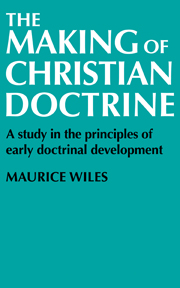Book contents
- Frontmatter
- Contents
- List of Abbreviations
- 1 The Development of Doctrine: The Nature of the Problem
- 2 Motives for Development in the Patristic Age
- 3 Scripture as a Source of Doctrine
- 4 Lex Orandi
- 5 Soteriology
- 6 The Form of the Arguments
- 7 The Assimilation of New Ideas
- 8 Towards a Doctrine of Development
- Index
1 - The Development of Doctrine: The Nature of the Problem
Published online by Cambridge University Press: 16 October 2009
- Frontmatter
- Contents
- List of Abbreviations
- 1 The Development of Doctrine: The Nature of the Problem
- 2 Motives for Development in the Patristic Age
- 3 Scripture as a Source of Doctrine
- 4 Lex Orandi
- 5 Soteriology
- 6 The Form of the Arguments
- 7 The Assimilation of New Ideas
- 8 Towards a Doctrine of Development
- Index
Summary
‘Dr owen chadwick, in his book From Bossuet to Newman, has provided a superb historical survey of the material [relating to the question of doctrinal development] but no Anglican theologian seems to have thought the problem itself worthy of his attention.’ So writes Dr Mascall, charging not only my Cambridge colleagues who contributed to Soundings but Anglican theologians at large with this sin of omission. It is no disrespect to Dr Chadwick's scholarship to say that I find little cause for surprise that his historical researches should not have given rise to much modern theological discussion of the question of doctrinal development. The historical story is full of fascination. One reads and one admires; one admires not only the narrator of the story but also the characters within it; one admires the broad sweep of their intellectual convictions and the detailed subtlety of their individual reasonings. But it is like reading a debate about the movements of the planets before the invention of the telescope. The general problems with which they were concerned are real problems; but the particular problems to which they addressed themselves so vigorously are not ours; and, more emphatically still, the way in which they approached them is not and cannot be ours. And so it is only in the most general manner that the historical treatment points on to the theological.
- Type
- Chapter
- Information
- The Making of Christian DoctrineA Study in the Principles of Early Doctrinal Development, pp. 1 - 17Publisher: Cambridge University PressPrint publication year: 1967

